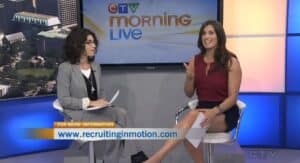
Take the power back and ace your interview by following these crucial steps for success.
The days leading up to an important interview are nearly always stressful, but as Recruiting in Motion’s Sari Cantor knows, a bit of preparation and some affirmations of confidence can go a long way to not only relieving that stress, but bringing you closer to the job you want.
If you are changing career fields, taking on new roles and responsibilities, or getting back into the job market after a hiatus, we believe it is important that you leave your interview feeling confident. Recruiting in Motion wants to provide you with all the helpful tips you need to ace your first impression with an employer, and get yourself a little closer to success.
Step One – Understand the Company
Every company is different. In the days leading up to your interview, it’s absolutely imperative for you to do as much research into their operations, business model, and culture as possible. Looking through the company website is a great start, but you should also check out what job postings they have online, take stock of their LinkedIn profile (and various other social media), and review their profile on Glassdoor (a service with provides Yelp-style reviews of companies) to see what kind of feedback has been provided by customers and employees.
Another option to exercise is to double check your network connections. You may have a friend, colleague or other connection who either works for or is familiar with the company where you will be interviewing. A quick email or LinkedIn message can connect you with valuable insider information on the company, their culture, and what it takes to work with them.
Read up as much as you can, as this will allow you to come up with some valuable questions during your interview – but more on that a little later.
Step Two – Proving your Expertise
At this point, chances are that the Human Resources professional managing the hiring process has narrowed down a few candidates with the experience to fit the role. Congratulations! One of those candidates is you!
What next?
Now is an excellent time to take a second look at your resume and the job posting to which you applied. Correlate between your skill set and the experience needed for the role, and begin to think up specific examples of how you have proven this skill to past employers. This is also your opportunity to engage your potential employer with anecdotes of your skill set, events surrounding your proactive responses to problems, or areas in which you’ve excelled in the past.
While your first instinct may be to stay modest and humble, this is really your time to shine! Positivity, excitement, and your experiences are what will really stand out here, so stand proud, and don’t be afraid to toot your own horn a bit.
Step Three – Is This the Right Company for You?
With a glance at your resume and a few calls out to your references, any Human Resources professional can verify your experience and understanding of the role. We all know it takes more than that to land a job. So, is this the right company for you? It’s important you ask yourself that question before heading into your interview, because it’s going to be the number one thing on the mind of the recruiter.
A very sizeable percentage of your interview will be dedicated toward understanding how well you fit in the company. This is why understanding the culture is so crucial.
Understanding your “soft skills”, or how you interact with others professionally, will be imperative to both you and the recruiter you interview with. This is usually when you’ll hear questions like “What are your strengths and weaknesses?” It’s important that your responses are honest and open. Questions like this will determine if you’re a good fit for the mentality and culture of the working environment.
Step Four – Turn the Tables: Ask some Questions!
Make sure you ask your recruiter some questions about the company that adhere to your own interests and goals. Does the company engage with any charitable organizations? What are the company’s plans for growth? What was one project the company was particularly excited about and how did they perform? How do they go the extra mile for their clients?
All of these are great examples of questions that will feed your interest in the company and prove to the recruiter that you mean business!
Don’t hesitate, and be honest with yourself if you’re not completely satisfied with the answers.
You can also ask questions pertaining to the position you applied for. You might ask when the company plans to make a decision on this role, or when you’ll be expected to start. Try to steer clear of any salary-related questions unless you’re asked.
By following these four steps, you should be totally and completely educated about the company, what the role entails, whether or not you’re the perfect role and company fit, and most importantly, whether or not the company is a good fit for you.
Click HERE to check out Sari Cantor discussing the art of acing the interview on CTV.
Click here to follow Sari Cantor on Twitter.
And don’t forget to follow us on Twitter and Facebook for more great tips on how to land your perfect role!